 Leading Blog | Posts by Month |
 Leading Blog | Posts by Month |
11.29.06

Humility Is a Core Quality Found In Great Leaders Humility is often misunderstood. As Bell writes: It’s not about self-deprecating insecurity; it’s much more about honest recognition of both strengths and weaknesses, reinforced by an attractive lack of preoccupation with either one. It’s the antithesis of self-absorption—the recognition that ‘it’s not about me.’ It’s not as someone put it, thinking less of yourself; rather, it’s thinking less about yourself. A selflessness is inherent in this kind of humility. It reflects a willingness to put the interests of the organization and of its people ahead of the leader’s own interests. Humility is rare in leaders, but when it’s there, it’s powerful. It’s powerful because it’s disarming. Humility rests firmly on the foundation of self-awareness. Humility generates two qualities: a thirst for personal growth and a healthy dose of self-discipline. [A thirst for personal growth because] it requires a certain measure of humility to recognize what you don’t know and an equal measure to want to keep on learning. [It also breeds a healthy dose of self-discipline because] humility recognizes that greatness requires work, and work requires self-discipline.
Posted by Michael McKinney at 12:02 AM
11.28.06

Five Tests of Obviousness WE’VE received a lot of interest over the last few days in a little book written 90 years ago, due to a Forbes commentary by Jack Trout entitled In Search Of The Obvious. The book is the business classic, Obvious Adams written by Robert Updegraff. Jack Trout calls it his favorite marketing book, although its application is far wider. Why does Jack like it so much?
WE’VE received a lot of interest over the last few days in a little book written 90 years ago, due to a Forbes commentary by Jack Trout entitled In Search Of The Obvious. The book is the business classic, Obvious Adams written by Robert Updegraff. Jack Trout calls it his favorite marketing book, although its application is far wider. Why does Jack like it so much?
Well, because the search for any marketing strategy is the search for the obvious. Consider the dictionary definition of the word "obvious": easy to see or understand, plain, evident. With that definition, you begin to see why an obvious strategy is so powerful. It's simple, easy to understand and evident. That's why it works so well. In 1953 Updepgraff added a section where is laid out five tests of obviousness: Test One: The problem, when solved will be simple. The obvious is nearly always simple--so simple that sometimes a whole generation of men and women have looked at it without even seeing it. Test Two: Does it check with human nature? If you feel comfortable in explaining your idea or plan to your mother, wife, relative, neighbors, your barber and anyone else you know, it's obvious. If you don't feel comfortable, it probably is not obvious. Test Three: Put it on paper. Write out your idea, plan or project in words of one or two syllables, as though you were explaining it to a child. If you can't do this in two or three short paragraphs and the explanation becomes long, involved or ingenious--then very likely it is not obvious. Test Four: Does it explode in people's minds? If, when you have presented your plan, project or program, do people say, "Now why didn't we think of that before?" You can feel encouraged. Obvious ideas are very apt to produce this "explosive" mental reaction. Test Five: Is the time ripe? Many ideas and plans are obvious in themselves, but just as obviously "out of time." Checking time lines is often just as important as checking the idea or plan itself. Jack adds, “To me, those five principles are worth a thousand books on marketing, mine included.” 
Posted by Michael McKinney at 08:06 PM

Charismatic Leadership and Social Change The problem of leadership appears most urgently at defining moments of history. A sharp crisis in social, economic and political affairs, when something must be done and done quickly, naturally intensifies interest in the role of a leader in history making. The society-shattering deed is possible only when the society is ripe for it. In the biblical phrase, things happen in the fullness of time. Delivery may be forced, but the child must be ready to enter the world. The leader acts only as a midwife who brings forth what is already mothered by the spirit of the age, or as the Germans say ‘zeitgeist’. We cannot sit back and wait for the event to happen. This is where commitment comes in. These who stand and wait are either cowards or traitors to the cause.  Apart from the qualities enumerated by Iqbal— lofty vision, mellifluous discourse and a passionate heart—the leader must possess charisma. [W]hen a social order nears bankruptcy, there is actually felt a desire among the people for a charismatic leader who may symbolize their deeply felt needs and aspirations. The charismatic leader is born in a climate of uncertainty and unpredictability. He moves in to bridge the gap between the discredited past and uncertain future. When the two ages overlap, one dying and the other refusing to be born, the historic need for charismatic leader arises, who has his hand on the pulse of time, and, who, above all, is closely attached to the common people. He is fired by the passion, inspired by the vision and totally committed to extricate the distraught people from the agony of uncertainty so as to lead them to safe haven. Tolstoy has correctly pinpointed the source of power of a charismatic leader. He says: “The power of a great leader lies neither in the physical nor moral qualities of him who possesses it. Power is the collective will of the people transferred by expressed or tacit consent to their chosen leader.” The objective conditions may be ripe for the radical transformation of a society, but without a leader who can command the respect and love of the masses, the historic opportunity may be lost. As former US president Woodrow Wilson once said: “When I look back on the process of history, I see this writing over every page that the nations are renewed from the bottom, not from the top, that the genius who springs from the ranks of the unknown men is the genius who renews the youth and energy of the people. The utility, the vitality and the fruitage of life does not come from the top to the bottom, it comes like the natural growth of a great tree from the soil, up through the trunk into the branches to the foliage and the fruit. The great struggling unknown masses that are the base of everything are the dynamic force that is lifting the levels of history. A nation is as great and only as great as her rank and file.” It is the dialectical relation between the charismatic leader and the struggling masses that makes history.
Posted by Michael McKinney at 12:01 AM
11.27.06

Sir John Harvey-Jones on Change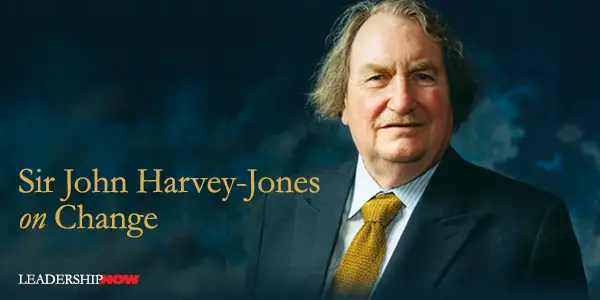
THE late John Harvey-Jones became the legendary Chairman of Imperial Chemical Industries (ICI) in 1982 and was knighted in 1985. His leadership has made him one of the most admired business leaders in the world. In his memoirs he wrote the following on change: “The reality of change is inescapable. If we do not change the inexorable forces of economics [then] shifts in the external world will force a change upon us. One might say, under such circumstances, how much better to change before we are changed. But in real life this historical perspective is very difficult to appreciate, and we find most change uncomfortable. We cling to sets of values and conditions which we recognize and which are undemanding of our own commitment and effort. It is a fool’s paradise, just as much as the hope that somehow one can get away from civilization, or that one can put the clock back. One cannot, and indeed one should not, because while it is foolish to throw away the past, it is the future that we can affect. The ability to create and manage the future in the way that we wish is what differentiates the good manager from the bad.” 
Posted by Michael McKinney at 07:30 AM
11.24.06

Gratitude: Is That a Stone On the Hill? Arden Barker had planted a 50-acre field of wheat that was now golden-brown, very full, and ready for harvest. It was a sight to touch the heart of any farmer. When his Uncle Harry came to visit, Arden proudly took him out to look at the field of wheat. Harry looked around, put his hand over his eyes to peer into the distance, and fixed his gaze on a boulder that had been too large to move in the middle of the field. “Is that a stone on the hill?” he asked. He said nothing about the field of wheat. Arden was crushed by his lack of enthusiasm.Too often leaders, managers and parents think that it is crucial to their role to point out where people could improve—to be critical. Certainly, there is a time for that, but it happens all too often. Effective leaders will look for the positive and show gratitude and appreciation for it. People often look to others for direction and support and if it is not forthcoming it can kill the spirit and impede growth.
Posted by Michael McKinney at 07:52 AM
11.23.06

Denzel Washington: A Hand to Guide MeThankful for what others have done to guide his life, Denzel Washington put together a valuable book that underscores the lesson: “If you want to change the world, start by changing the life of a child.”A Hand to Guide Me focuses on some important concepts for and value of laying a firm foundation for children by providing examples from the lives of over 70 people like Presidents Jimmy Carter and Bill Clinton, Whoopi Goldberg, Phil Jackson, Hank Aaron, Muhammad Ali, John Antioco, Yogi Berra, Jimmy Carter, Wesley Clark, Jackie Joyner-Kersee, Fr. Monk Malloy, Joe Morgan, Toni Morrison, Colin Powell, Bonnie Raitt, Cal Ripken Jr., Bernard Shaw, George Streinbrenner, Ruben Studdard, John Wooden. Here are a few thoughts by Denzel Washington from the book: • “Train up a child in the way he should go, and when he is old he will not depart from it.” Powerful words don’t you think? It’s a simple sentiment too, and yet I’m amazed how many people lose site of it these days. • Show me a successful individual and I’ll show you someone who didn’t want for positive influences in his or her life. I don’t care who you are or what you do for a living—if you do it well I’m betting there was someone cheering you on and showing you the way. I’ll lay even odds. • This is book is about that certain push, that helping hand we’ve all had to reach for in order to get where we’re going. Train up a child in the way he should go, and he might get to where he’s meant to be headed all along. • I didn’t always make the best choices or put myself in the best situations, and yet at they same time I have to think I made better choices because of the extra efforts of my parents and teachers and coaches, and I put myself in better situations that I might have if I’d been going about it on my own. I had a better chance to find my way because I was open to so many positive outside influences. • The good people you’ve heard from here have all benefited from a guiding hand or two or three. They’ve been on the receiving end of some profound words of wisdom, or they’ve patterned their lives after men and women or principle. They’ve seen one good turn and helped it blossom into another. Or they’ve made a mistake and managed to learn from it and move on. And that’s the greatest lesson we can all take with us as we set this book aside and return to our lives. Keep open—to possibility, to opportunity, to wonder—or remain forever shut off to the encouraging outcomes that await us all. Change happens. The key is to keep reaching for that guiding hand and to keep extending our own. An early influence in Denzel Washington's life was the Boys Club. Some of the proceeds from the sale of this book are earmarked for the 100 year old Boys & Girls Clubs of America. This book is a good reminder to honor those whose shoulders you stand on and redouble your efforts with others.
Posted by Michael McKinney at 08:32 AM
11.22.06

Pamela Thomas-Graham: A Woman For All Seasons
IN a recent column by Harvey Mackay, author of Dig Your Well Before You're Thirsty, he shared his impressions of a New York Sun article written by Pranay Gupte. The article featured Pamela Thomas-Graham, the new head of Liz Claiborne. MacKay writes, “It fascinated me. I wondered how one woman could accomplish so many things and do all of them so well.” Here are some excerpts from that column: There was a big clue. Throughout the article, Ms. Thomas-Graham praised her parents and their Presbyterian church for the values they instilled in her. "I was brought up to challenge myself, to try to be successful on my own terms. I was brought up to be focused. So I see myself as more fully engaged than ever before," Ms. Thomas-Graham responded when asked why she accepted the burden of revitalizing the flagship Liz Claiborne brand as well as nine others. The brands she oversees bring in annual revenues just shy of $1 billion.
Posted by Michael McKinney at 12:03 AM
11.20.06

Management & Leadership The distinction between management and leadership is, in my view, crucial. Leadership is about how you use the influence and trust that people grant you to define necessary change and chart the future direction of the organization. Management is about how you earn that influence and trust in the first place.
Posted by Michael McKinney at 08:41 AM
11.17.06

How To Enhance Your Potential While Working Your Current Job
MENTORS, seminars, multimedia, and books (and this site, of course) are great ways to learn about leadership and areas that you need to think about to round out your leadership capabilities. But nothing takes the place of application and practice. Leadership is not developed in the classroom. The problem (sorry, I meant challenge) we often run into is the opportunity to practice leadership. According to Cindy McCauley from the Center for Creative Leadership, “Seeking out new challenges while remaining in your current job is a practical, effective strategy to pursue.” Taking on new or different assignments allows leaders to intentionally develop new skills, practice new behaviors and improve on weaknesses. She suggests three ways to do this in her book, Developmental Assignments: Creating Learning Experiences without Changing Jobs:
Not every challenge is a prime opportunity to learn, says McCauley. Research shows that certain kinds of challenges stimulate learning more than others. "To adapt and grow, leaders need to be constantly seeking out new experiences and challenges that, by their very nature, foster learning.” Ten key challenges are listed below, along with a few suggestions for ways to seek such challenges.
McCauley counsels to select a challenge that will broaden your experience base. Ask yourself: Which of the challenges have I had the least exposure to? Are there some that I haven't experienced in a number of years? Are there any that my current job never provides? Then choose a specific activity or assignment from the list or make up your own. You can find many more specific ideas in Developmental Assignments: Creating Learning Experiences without Changing Jobs 
Posted by Michael McKinney at 05:13 AM
11.15.06

Anwar el-Sadat on Life and Leadership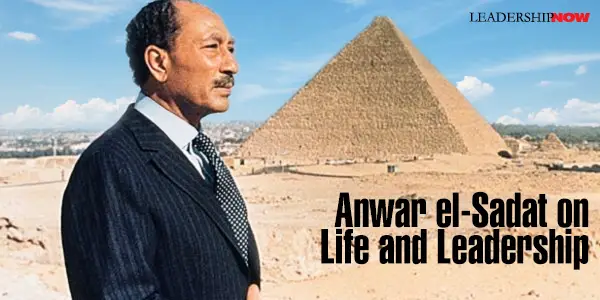
Anwar el-Sadat was a remarkable leader. He became president of Egypt after Nasser’s untimely death in October 1970. For his efforts to bring about peace with Israel, he shared the 1978 Nobel Peace Prize with Israel’s Menachem Begin. Just over 25 years ago, on October 6, 1981, Sadat was assassinated by terrorists. Here are some thoughts from his 1978 autobiography, In Search of Identity: 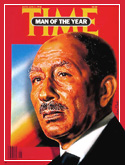
Posted by Michael McKinney at 06:58 AM
11.13.06

Before You Accuse, Ask
LEADERS not only ask smart questions, but are smart about asking questions. And listening. A good question can change everything. Gordon MacDonald maintains that a key to effective leadership is the ability to ask the right questions at the appropriate time that will elicit insight and clarity. Of course, that's not always an easy thing to do. It takes thoughtful practice. He writes in the Fall 2006 issue of the Leadership Journal, “That’s the power of the interrogative sentence. A good one, a real good one, alters things. It ignites thought; it can demand commitment, reveal depth or shallowness in a person’s soul, disclose hidden agendas.” He writes about all kinds of questions, but there was a section that was especially helpful. He referred to times when we should be asking questions when we desperately want to be talking—like when we feel we have been wronged or run into conflict with another person or organization. The temptation is to launch an attack, lay down the law, or simply explain our point of view and let the pieces fall where they may. MacDonald wisely advises that instead, this is the time to proceed first with a few questions. He writes: Over and over this principle—ask before accusing—has rescued me from making a fool of myself. So in conflicting moments I’ve learned to use questions like these: The ability to ask smart questions requires that you take the time to think beyond the issue on the table and see often times what are the real underlying issues.
Posted by Michael McKinney at 07:20 AM
11.10.06

7 Ways Leaders Handicap Themselves
IN A BOOK that captures the essence of leadership—Great Leadership—author Anthony Bell writes, "For all the importance of great leadership, it doesn’t happen by itself. Without a framework, leaders often handicap themselves in a number of significant ways." He outlines these issues:
Bell writes, "To overcome these obstacles, leaders need some guidelines; they need a framework for understanding and exercising great leadership. Leaders stand or fall not so much by their talent or lack of it as by their understanding or misunderstanding of what great leadership is." In his book he discusses a well presented framework that consists of three dimensions of leadership—organizational, operational, and people leadership. He demonstrates how these three dimensions, when properly integrated and applied, will greatly enhance the quality of your leadership. 
Posted by Michael McKinney at 12:12 AM
11.09.06

Can’t Think For Yourself?
ARE CONSULTANTS making us insecure? Are we afraid to make decisions for ourselves? According to a recent article in the Guardian even consultants are saying enough is enough. Guy Clapperton reports: Alastair Clifford-Jones, chief executive of management consultancy Leadent, has identified what he calls "consultancy addiction" - the process by which clients get so hung up on having consultants around that they won't let them go. "You just see that people are using consultants and work alongside them - you go to a meeting and next to them is a consultant," he says. "It's like losing the ability to make a decision." Indeed, some consultants actually create this dependency by not giving the client the decision making responsibility. Clapperton continues: Simon Rawling, head of project management consultancy PIPC, puts a lot of the onus on the client's stated requirements. "The consultant should help with the business and not run it," he says. "They can put a new IT platform in, put a required change in, but not run the day to day business." People have to recognize the roles of consultants before commissioning them, he says. Consultants can be of immense value to an organization—and often quite wise—by bringing awareness of another viewpoint or approach. In the end, for successful change to occur, the change needs to become a part of the organization's culture and that only happens by implementing it yourself. You can’t outsource out change. Consultants influence, guide, facilitate and structure change, but the goal is ownership by the organization and not the partnership. Capperton offers the following five questions as an Addicted to Consultancy Self-Check: Ask yourself the following questions to find out whether you're over-using consultants: 1. Can you say for certain, or even roughly, when your consultant will be leaving the premises permanently? 2. Do you have a good reason for not taking someone on as staff to fulfill the consultant's role? 3. Do you have a defined objective for the consultancy you've employed? 4. Do you ask your consultant for advice on matters other than the task for which you hired them? 5. Do your employees refer to the consultant as the "owner" of an initiative, as distinct from the internal sponsor? Answer "yes" to the first three questions and "no" to the last two and you're likely to be using consultants sensibly. "No" to the first three and "yes" to the last two means you're using consultants as a crutch rather than a defined part of your business. Ask them about it - if they're any good they'll probably be pleased to hear it from you rather than having to raise it themselves.
Posted by Michael McKinney at 08:54 AM
11.08.06

Crunch Point: Test Your ExcusesBrian Tracy explains in his new book that when you are at a crunch point—that point where problems, difficulties, unexpected reversals,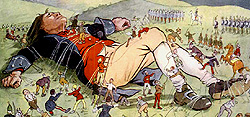 There is a way that you can test your excuses to see if they are valid. It is simply to ask yourself, ”Is there anyone else who has my same excuse but who is moving ahead and succeeding nonetheless?”He suggests once you have identified your main constraint, focus on it until it is eliminated. Don’t let minor issues sidetrack you from alleviating that one constraint. Always bear in mind that your own resolution to succeed is more important than any other one thing. —Abraham LincolnRelated Post: Challenge Assumed Constraints
Posted by Michael McKinney at 12:17 AM
11.06.06

Five Hardships Leaders Face and the Lessons They Teach
Adapted from The Center for Creative Leadership Handbook of Leadership Development.
Posted by Michael McKinney at 08:58 AM
11.03.06

Peter Drucker on What a President Needs to be EffectiveIn the August 1960 Harper’s Magazine, Peter Drucker wrote, “What a President needs is an active mind—a mind interested in other people and their ideas; able to find the kernel of sense in a farrago of abstract theorizing; quick to see where imagination turns into riot, but also where logic turns into absurdity. Such a mind needs constant nourishment and stimulation through the ideas of others.” He is suggesting that a president needs people with ideas; people that can fire the imagination with hope that new things can be done.Drucker felt that the contemporary leader that made the most use of such people was General Douglas MacArthur as Supreme Commander in occupied Japan. 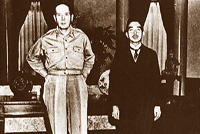
Posted by Michael McKinney at 08:21 AM
11.01.06

Leadership Books: November 2006Here's a look at some of the best leadership books being released in November. For a look a little further out see the Winter 2006 releases.    
Posted by Michael McKinney at 12:01 AM
|
BUILD YOUR KNOWLEDGE


How to Do Your Start-Up Right STRAIGHT TALK FOR START-UPS 
Grow Your Leadership Skills NEW AND UPCOMING LEADERSHIP BOOKS 
Leadership Minute BITE-SIZE CONCEPTS YOU CAN CHEW ON 
Classic Leadership Books BOOKS TO READ BEFORE YOU LEAD |
|